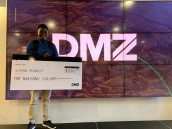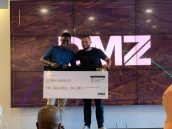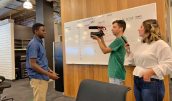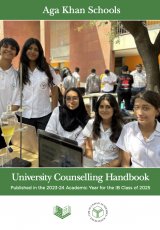Raphael Mwachiti: Academy student uses haptic technology to help the visually impaired
 Raphael Mwachiti with his prize money after winning the DMZ Sandbox competition.Raphael Mwachiti, a student at the Aga Khan Academy Mombasa, has won the Ryerson Sandbox Basecamp prize for his innovation to assist visually impaired people, awarding him a grant of $5,000 CAD and specialist professional advice to help advance his start-up.
Raphael Mwachiti with his prize money after winning the DMZ Sandbox competition.Raphael Mwachiti, a student at the Aga Khan Academy Mombasa, has won the Ryerson Sandbox Basecamp prize for his innovation to assist visually impaired people, awarding him a grant of $5,000 CAD and specialist professional advice to help advance his start-up.
Ryerson University, located in Toronto, Canada, runs an intensive boot camp for six weeks every year. Students are invited to submit their solutions to real life issues, and once they pass a rigorous application process, they are selected to attend the camp. Over the 6-week period, students attend intensive sessions to develop, market and accelerate their business ideas. Ryerson is providing 12 fellowships over three years for Academies students and faculty to attend the Sandbox Basecamp. The collaboration came about in 2017 following a visit by Mohamed Lachemi, president and vice-chancellor of Ryerson University, to the Aga Khan Academy Hyderabad. The 2019 Basecamp had 27 students, some working in pairs and others working alone. There were 19 projects in total with three winners.
 Raphael Mwachiti (far left) with Abdullah Snobar (far right), Executive Director of the DMZ, after winning the DMZ Sandbox competition.Raphael founded Ultran Mobility, a business that focuses on improving the lives of visually impaired people. Whilst participating in community service, Raphael noted that visually impaired people sometimes struggled with day-to-day living; the white cane that is traditionally used only assists people in telling them where the hazards are when the cane has already come across the hazard, and not before. Raphael began researching the subject and found that of the millions of visually impaired people worldwide, 90% resided in developing countries. Furthermore, only 10% are able to work and contribute to the economy. Raphael created a solution that uses technology to detect objects within eight metres of the user. Once the object is detected, the device uses haptic feedback, or vibrations, as well as audio feedback to alert the user.
Raphael Mwachiti (far left) with Abdullah Snobar (far right), Executive Director of the DMZ, after winning the DMZ Sandbox competition.Raphael founded Ultran Mobility, a business that focuses on improving the lives of visually impaired people. Whilst participating in community service, Raphael noted that visually impaired people sometimes struggled with day-to-day living; the white cane that is traditionally used only assists people in telling them where the hazards are when the cane has already come across the hazard, and not before. Raphael began researching the subject and found that of the millions of visually impaired people worldwide, 90% resided in developing countries. Furthermore, only 10% are able to work and contribute to the economy. Raphael created a solution that uses technology to detect objects within eight metres of the user. Once the object is detected, the device uses haptic feedback, or vibrations, as well as audio feedback to alert the user.
 Young entrepreneur Raphael Mwachiti talks to the camera about his prize-winning innovation to assist visually impaired people.During his time at the Sandbox Basecamp, Raphael was able to learn how to succinctly pitch his business to different audiences, how to use different marketing channels and how to formulate a long-term strategy for his business. Students attending the camp were also taught about the legal and financial aspects of running a business as well as how to analyse market trends. Global companies such as Google and Facebook invited the students to their offices to learn more about their business model and what makes them successful.
Young entrepreneur Raphael Mwachiti talks to the camera about his prize-winning innovation to assist visually impaired people.During his time at the Sandbox Basecamp, Raphael was able to learn how to succinctly pitch his business to different audiences, how to use different marketing channels and how to formulate a long-term strategy for his business. Students attending the camp were also taught about the legal and financial aspects of running a business as well as how to analyse market trends. Global companies such as Google and Facebook invited the students to their offices to learn more about their business model and what makes them successful.
Ultran Mobility improves the quality of life directly in the community where Raphael lives, a fact that made his project stand out. Raphael has cultivated relationships in this community and built a team of advisors who he says are “always willing to help when I get stuck”. It was also the price point and accessibility of the device that set Raphael’s product apart.
Raphael received $5,000 CAD for winning, as well as access to a law firm to help with incorporating his company and patenting his concept. Winners can use their prize money as they wish, and Raphael intends to use his to create more units of his device for customer testing and feedback. He hopes to continue to build relationships with different organisations whilst finding a sustainable method of mass-producing his device. Raphael was thrilled to have won the prize and said, “I am filled with excitement for the adventure ahead of me”.




